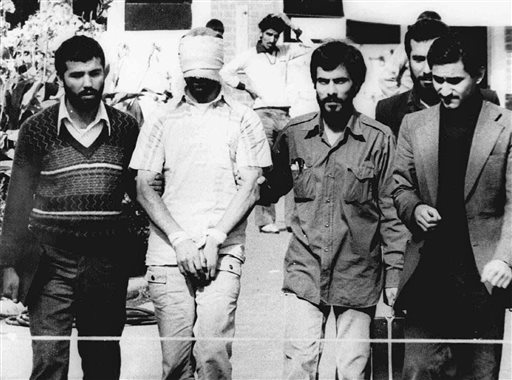(AP) Former hostages react to Iran’s nuclear deal
By MATTHEW BARAKAT
Associated Press
McLEAN, Va.
A nuclear deal between the U.S., Iran and other world powers has been described as a trust-building step after decades of animosity that hopefully will lead to a more comprehensive deal down the road.
But for many of the Americans who were held hostage at the start of the Iranian revolution, trusting the regime in Tehran feels like a mistake.
The hostage crisis began in November 1979 when militants stormed the United States Embassy in Tehran and seized its occupants. In all, 66 were taken hostage. Thirteen were released less than three weeks later in 1979; one was released in July 1980; the remaining 52 were released Jan. 20, 1981.
Retired Air Force Col. Thomas E. Schaefer, 83, called the deal “foolishness.”
Schaefer was a military attache in Iran who was among those held hostage. He now lives in Scottsdale, Ariz., with his wife of more than 60 years, Anita, who also takes a dim view of the agreement: “We are probably not very Christian-like when it comes to all this,” she said.
The weekend agreement between Iran and six world powers _ the U.S., Britain, France, Russia, China and Germany _ is to temporarily halt parts of Tehran’s disputed nuclear program and allow for more intrusive international monitoring of Iran’s facilities. In exchange, Iran gains some modest relief from stiff economic sanctions and a pledge from Obama that no new penalties will be levied during the six months.
To be sure, the former hostages have varying views. Victor Tomseth, 72, a retired diplomat from Vienna, Va., sees the pact as a positive first step.
Tomseth, who was a political counselor at the embassy in Tehran in 1979, had written a diplomatic cable months before the hostage crisis warning about the difficulties of negotiation with the Iranians.
Still, he said in a phone interview Monday that it is possible to cut a mutually beneficial deal with them.
He said he considers the deal “in a category of an initial confidence measure.”
John Limbert, 70, of Arlington, who was a political officer held hostage during the crisis and later became deputy assistant secretary of state for Iran in 2009 and 2010, also supports the deal. He said he does not view it in terms of whether Iran can be trusted, but whether the regime recognizes that a deal is in their own interest.
He said it’s a mistake to be overly pessimistic about the prospects for a deal.
For other hostages, though, their experience has led them to the conclusion that attempting to negotiate and expecting Iran to live up to its end of the bargain is a losing proposition. Sgt. Rodney “Rocky” Sickmann, 56, of St. Louis, then a Marine sergeant, remembers clearly being told by his captors that their goal was to use the hostages to humiliate the American government, and he suspects this interim deal is in that vein.
The deal may also have a direct effect on some of the hostages who have long fought to sue the Iranian government for damages. The new agreement calls for $4.2 billion in frozen Iranian assets to be released, which could make it more difficult to collect a judgment on any successful lawsuit.
___
Associated Press writer Gene Johnson contributed to this report from Seattle.

COMMENTS
Please let us know if you're having issues with commenting.